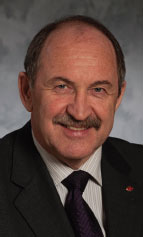 Dr. Ronald G. Smith
Dr. Ronald G. Smith
I recently returned from Salvador da Bahia, Brazil, where I led CDA's delegation at the FDI Annual World Dental Congress. Representatives of more than 130 countries were in attendance at this year's session, giving voice to almost 1 million dentists worldwide. The FDI Congress provides CDA with an opportunity to engage with dental leaders from these countries and to share ideas, discuss challenges and propose solutions to issues affecting the profession. Such international gatherings make it clear that dentistry's issues extend well beyond one country's borders.
For instance, global policy developments regarding the mining of mercury could have a significant impact on Canadian dentistry. The United Nations Environmental Program (UNEP) is looking to secure a legally binding treaty that will restrict the international mining of mercury and related commercial activities. UNEP has set a target to reduce the global supply of mercury by 50% by 2013, compared to the supply available in 2005. Such sweeping legislation could restrict the availability of dental amalgam worldwide.
Although mercury from dental amalgam represents only a minute portion of mercury that could possibly enter the environment due to improper storage or disposal, amalgam often gets painted with the same broad legislative brush that targets mining and industrial use of mercury. FDI is taking proactive measures on this issue and has joined UNEP's Global Mercury Partnership to ensure that the views of the international dental community are accurately represented in all United Nations discussions governing mercury.
While Canadian dentists are often fortunate to be able to make choices about their restorative materials, there are many countries where such choice is simply not available. FDI has emphasized to the UN that dental composites are currently not an economically viable restorative filling material in many regions of the world, especially in developing countries where the use of composites would present clinical, logistical and economic challenges.
In Brazil, the FDI General Assembly passed a resolution which states clearly that amalgam is a safe and highly effective restorative material. Any phase down of its use would be inappropriate until a suitable alternative restorative material is more widely available. Canada played an important role in these discussions, which were led by our country's Chief Dental Officer Dr. Peter Cooney, who also serves on FDI's Dental Amalgam Task Team.
Engaging in such discussions made me more aware that the problems faced by the global dental profession are complex and interconnected. As dentists, we are all affected by what occurs on the global health scene. CDA stays informed on such developments by maintaining strong relationships with organizations nationally and internationally. In Brazil, we held bilateral meetings with the American Dental Association (ADA). One topic of discussion was CDA's recent branding initiative (p. 271). The ADA indicated that it is contemplating work on a similar project.
CDA actively participates in FDI to represent the interests of Canadian dentistry on the world stage and to gain greater awareness of global dental issues. Canada's voice and perspective within the international dentistry community have always been viewed positively. This legacy is set to continue as Dr. Jack Cottrell of Port Perry, Ontario, was elected to the FDI Council for a 3-year term in Brazil. Dr. Cottrell's experience as a past-president of CDA, along with his voluntary work in developing countries, will be valuable to FDI's future policy development and program planning efforts.
As a profession, we must remember to look globally and to be aware of the oral health inequities that exist around the world. CDA will continue to play a significant role in seeking solutions to these issues and in helping FDI achieve its mission of leading the world to optimal oral health.
